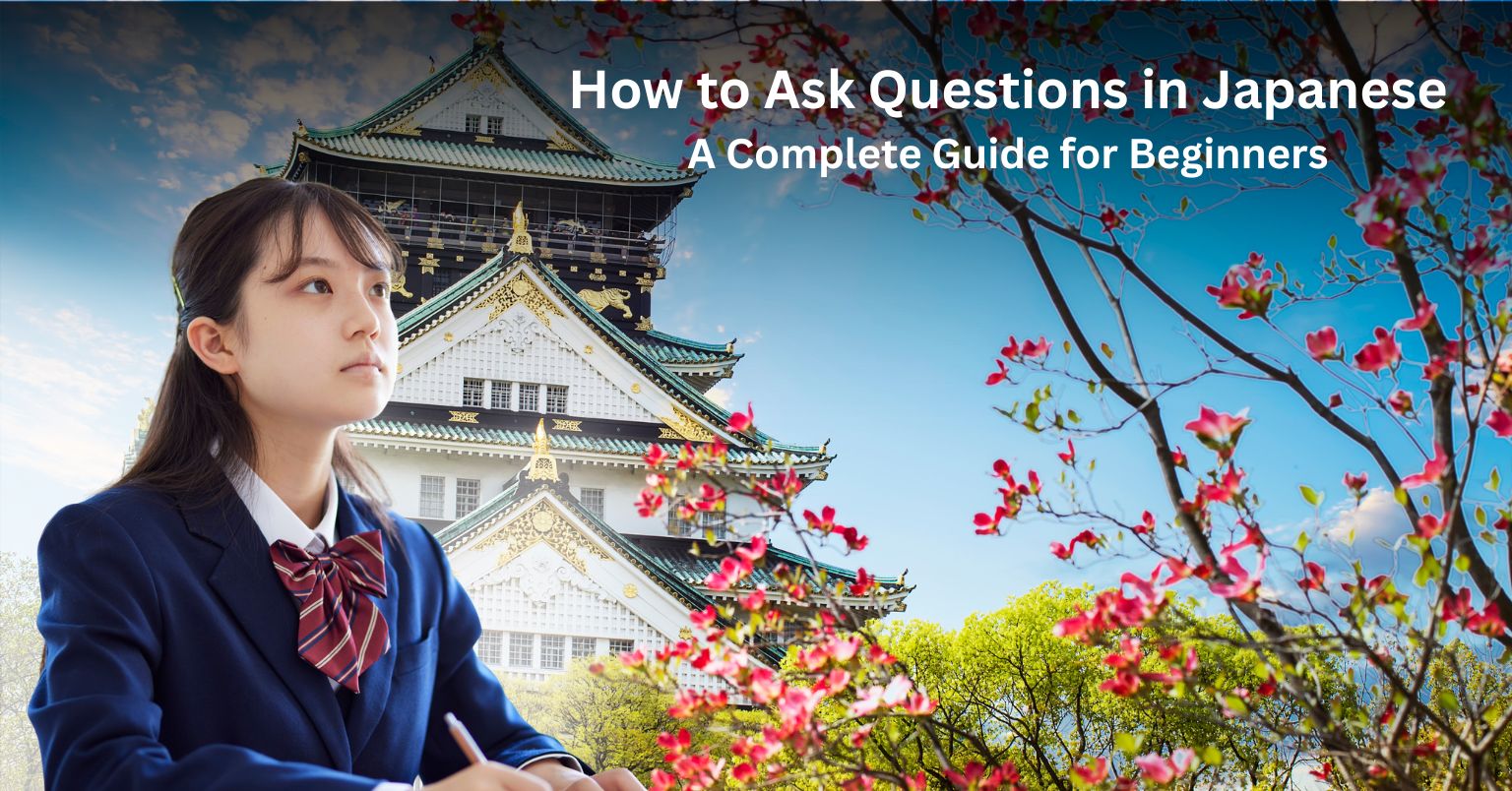Introduction: Why Learning to Ask Questions Matters
Asking questions is one of the most essential skills in any language. In Japanese, it is not only about the words but also about expressing curiosity with respect and cultural sensitivity. Enrolling in a japanese language course Singapore can help you master this unique style of communication. If you are traveling, studying, or making new friends, the ability to ask questions in Japanese empowers you to connect deeply with others.
At Inspilingua, we believe language learning should feel natural, meaningful, and culturally immersive. That’s why we have created this complete beginner’s guide to asking questions in Japanese not just as a list of phrases, but as a tool to help you engage in real-life conversations.
Why Learning to Ask Questions in Japanese Matters
When you visit Japan or interact with native speakers, you will quickly realize that asking questions helps you:
- Navigate new places (asking directions or prices)
- Order food and shop with confidence
- Make friends and spark conversations
- Show politeness and curiosity, both highly valued in Japanese culture
Learning how to ask questions early in your Japanese language journey gives you an edge in becoming an active speaker instead of just a passive learner.
The Structure of Japanese Questions
Japanese questions often follow a very straightforward structure. Unlike English, Japanese doesn’t always use a rising tone at the end of a question. Instead, a simple particle ka ( か ) is added at the end of a sentence to indicate it’s a question.
Example:
- これはあなたのなまえですか?
(Kore wa anata no namae desu ka?) – Is this your name?
Even without a question word, adding ka turns a statement into a question.
Essential Japanese Question Words
Here are the most common question words you will use in Japanese:
| English | Japanese | Romaji | Example | Translation |
| Who | だれ | dare | このひとはだれですか。 | Who is this person? |
| What | なに / なん | nani / nan | これはなんですか。 | What is this? |
| Where | どこ | doko | えきはどこですか。 | Where is the station? |
| When | いつ | itsu | いついきますか。 | When are you going? |
| Why | なぜ / どうして | naze / doushite | なぜいきませんか。 | Why aren’t you going? |
| How | どう | dou | おげんきですか。 | How are you? |
| Which | どれ | dore | どれがいいですか。 | Which one is good?
|
Polite vs. Casual Questions
In Japanese, formality matters. Using the polite form is recommended unless you’re speaking with close friends or children.
Polite Example:
- これはなんですか?(Kore wa nan desu ka?) – What is this?
Casual Example:
- これなに?(Kore nani?) – What’s this?
Use polite form (desu/masu + ka) in most social or professional situations.
Everyday Question Scenarios
- At a Restaurant
- これはなんの料理ですか?
(Kore wa nan no ryouri desu ka?) – What kind of dish is this?
- ごちゅうもんはどこですか?
(Gochuumon wa doko desu ka?) – Where do I order?
- At a Hotel
- チェックインはなんじかんまでですか?
(Chekkuin wa nanji made desu ka?) – Until what time is check-in?
- トイレはどこですか?
(Toire wa doko desu ka?) – Where is the bathroom?
- Shopping
- これはいくらですか?
(Kore wa ikura desu ka?) – How much is this?
- これもありますか?
(Kore mo arimasu ka?) – Do you have this too?
- What
- これは何ですか?
Kore wa nan desu ka?
(What is this?) - 何を食べますか?
Nani o tabemasu ka?
(What will you eat?)
- Where
- 駅はどこですか?
Eki wa doko desu ka?
(Where is the train station?) - トイレはどこですか?
Toire wa doko desu ka?
(Where is the bathroom?)
- Who
- 彼は誰ですか?
Kare wa dare desu ka?
(Who is he?) - 誰が来ますか?
Dare ga kimasu ka?
(Who is coming?)
7. When
- いつ行きますか?
Itsu ikimasu ka?
(When will you go?) - テストはいつですか?
Tesuto wa itsu desu ka?
(When is the test?)
8. Why
- なぜ遅れましたか?
Naze okuremashita ka?
(Why were you late?) - どうして勉強しますか?
Doushite benkyou shimasu ka?
(Why are you studying?)
9. How
- どうやって行きますか?
Dou yatte ikimasu ka?
(How do you get there?) - これはどう使いますか?
Kore wa dou tsukaimasu ka?
(How do you use this?)
10. Which
- どれが好きですか?
Dore ga suki desu ka?
(Which one do you like?) - どの映画を見ますか?
Dono eiga o mimasu ka?
(Which movie will you watch?)
Practice Dialogues
Let’s walk through a few complete beginner dialogues:
Scene: Asking for Directions
You: すみません、えきはどこですか?
(Sumimasen, eki wa doko desu ka?) – Excuse me, where is the station?
Local: まっすぐいって、さぎのかどをひだりです。
(Massugu itte, sagi no kado o hidari desu.) – Go straight and turn left at the next corner.
Scene: Meeting Someone
You: おなまえはなんですか?
(Onamae wa nan desu ka?) – What’s your name?
Them: わたしはゆきです。
(Watashi wa Yuki desu.) – I’m Yuki.
Yes/No Questions in Japanese
These are the easiest types of questions to learn. Just add “か” at the end of the sentence, and you’re asking a question!
Examples:
- これは本ですか?
Kore wa hon desu ka?
(Is this a book?) - あなたは学生ですか?
Anata wa gakusei desu ka?
(Are you a student?)
Answers:
- はい (hai) – Yes
- いいえ (iie) – No
Cultural Tips for Asking Questions Politely
In Japanese society, politeness and humility are very important. Even questions can sound too direct if not phrased properly.
- Begin with “Sumimasen” (すみません) – It means “Excuse me” and softens the question.
- Maintain a respectful tone – Especially when speaking with elders or service staff.
- Don’t interrupt – Silence can be respectful in Japan. Wait for a pause.
- Body language matters – Slight bows and open posture go a long way.
Use polite phrases like:
- すみませんが…
Sumimasen ga…
(Excuse me, but…) - 〜を教えてください。
~ o oshiete kudasai.
(Please tell me ~.)
Example:
Instead of bluntly asking:
これはいくら? (How much is this?)
Use:
すみません、これはいくらですか?
(Excuse me, how much is this?)
At Inspilingua’s Japanese language course, we train you not just in grammar, but also in proper tone, body language, and cultural norms so you can feel confident and respectful.
Practice Makes Progress: How to Build Confidence
Here are tips to strengthen your skills:
- Use flashcards for question words.
- Practice short dialogues with a tutor or classmate.
- Watch anime or dramas, and listen to how characters ask questions.
- Ask one question a day in Japanese when out and about, even to yourself!
Conclusion: With Curiosity and Respect
Learning to ask questions in Japanese is about more than just language. It’s about connection. It’s how you show curiosity, respect, and a willingness to understand someone else’s world. Japanese may seem intricate at first, but every time you ask a question, you take a courageous step into understanding and friendship.
With practice and the right support from our dedicated team at Inspilingua you will soon be asking questions that lead to smiles, stories, and meaningful conversations.

